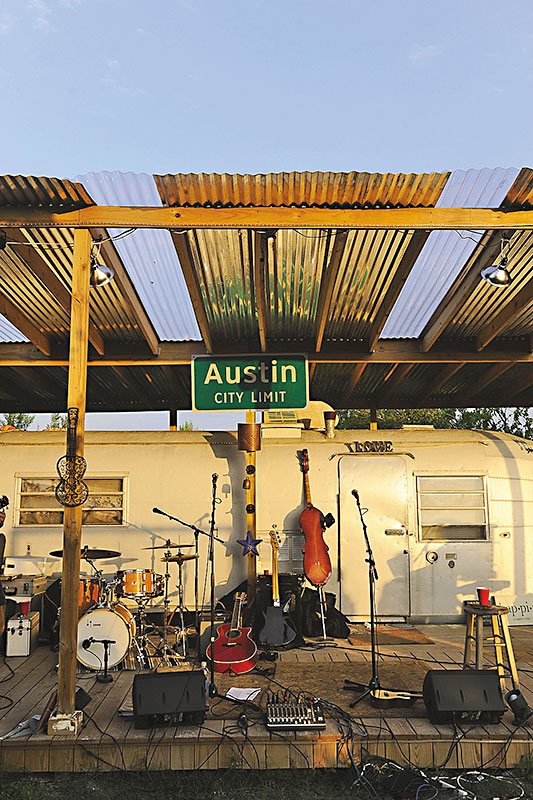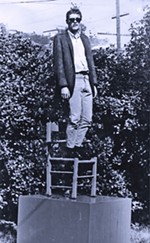We Can't Make It Here Anymore
Austin music arrives at the affordability crossroads
By Doug Freeman, Fri., May 27, 2016

Mark Addison's Aerie Studio sits on the outskirts of town, in the limbo of the Extraterritorial Jurisdiction, unincorporated land near the Austin city limits. Short drive, but a world away.
The turn south down Old Lockhart Road off Slaughter Lane opens into an expanse of country, though new subdivision developments already dot the tight, winding road. Addison's 8-acre plot of land rises from an unmarked dirt driveway like an oasis against the distant city skyline.
Behind Addison's small house and studio, Wendy Colonna's silver 1964 Avion trailer gleams in the waning sunset. A new wooden porch in front of the trailer doubles as a stage for the series of house concerts they began hosting in March. The "Austin City Limit" sign hung on the center post seems to emphasize more an outlying boundary than the welcoming threshold to the Texas state capital.
"For two years I spent all my time on the road, and I wasn't sure if I was going to stay in Austin or relocate," Colonna admits. "I couldn't afford to live in Austin as a single person. There's just no place, unless I'm living in a band house, which is not where I am in my life as a 38-year-old woman."
Last October, the local singer-songwriter asked Addison if she could move the trailer onto his land. Guitarist Billy Masters had already made his home in a trailer on the property that Addison purchased in 1999, and former Band of Heathens songwriter Colin Brooks built a house on another patch of Addison's land.
"I paid this place off two years ago, so I can offer Wendy and Billy and other people a cheap place to stay, and we can make some music," says Addison. "Our dream for this place is to build a central unit that has a communal kitchen and communal shower rooms and bathrooms. I could see maybe another 10 folks out here."
Addison's budding artist commune is his circumstantial response to the increasingly urgent crisis facing his Austin peers. If the last decade's music industry upheaval hadn't already left most musicians teetering on the brink of sustainability (see "Pennies From Heaven," May 18, 2012), the exploded cost of living in the live music capital of the world is finally pushing artists out.
"None of us can afford to live here anymore," offers Danny Reisch from his home studio on East Third Street, where he's produced albums by some of Austin's biggest indie acts (Grupo Fantasma, Okkervil River, White Denim) in the past decade. "My rent is $700 more now than it was when I moved in, and it could be a lot more than that, but it's not just about the price of rent going up. It's the threat that, if you're renting a house, anyone can sell it at any moment and you're out.
"Even if I'm able to cobble together the rent, it's about the security of knowing I can commit to a [future] project."
Next month, Reisch moves his studio to Lockhart, which has suddenly received an influx of Austin expat artists. Members of RF Shannon opened a coffee shop in the barbecue bypass, and Natalie Ribbons and Jason Chronis of darkwave-pop quartet Tele Novella have likewise taken up residence. Also inbound is song siren Dana Falconberry, who's moving onto property owned by Lovely Sparrows frontman Shawn Jones.
"We're maybe on the front end of what could be a migration," offers Reisch. "People are just getting pushed further and further out, and at a certain point, no matter how far out you go, it just isn't financially feasible to try to live in a place that's so expensive."
Moving the Needle
On Feb. 26, Mayor Steve Adler held a press conference to present his Austin Music & Creative Ecosystem Omnibus Resolution (see "Playback: The Mayor's Plan to Save Austin Music," March 4), a move to stimulate local music industry growth. The Economic Development Department then had 90 days to deliver its recommendations on how to proceed to City Council. On April 26, the EDD gave a draft of its conclusions to a joint committee of the Austin Music Commission and Arts Commission.
Its 72 proposals, addressing four key areas of support for the creative community in Austin – affordability, city regulations, professional development, and health and education – now makes its way to City Council on June 3 and will serve as the first major test of the new 10-1 Council's commitment to the local arts. The Music Commission, up from six members to 11, already revamped.
"The greatest challenge has been to find common strategic ground between 11 members," says Gavin Garcia, who assumed the Music Commission chair last July. "It's like we went from a trio to Chicago with its full-blown horn section. Individual commissioners approached issues from different cultural contexts, but the commissioners today have the advantage of helping create public policy as advocates for the industry that wasn't present when the six commissioners represented just one district overall. That era is past."
The new commission is also armed with data like never before, thanks to the previous commission having built last year's comprehensive Austin Music Census (see "Playback: Austin Music Census," June 5, 2015) and studies from industry advocacy group Austin Music People. AMP's Austin Music Industry Economic Impact Study details that the local music economy has risen to a $1.8 billion high, but the drivers of that money have significantly shifted. Festivals and major shows now propel the market, while the impact of local artists, businesses, and venues has declined more than 15%.
At Spider House last month, Adler addressed a few dozen artists and industry professionals for the final of 10 music summits held by the Music Commission in each district. From the back patio stage, Adler emphasized the city's commitment to the music scene, but also the need for the music community to coalesce and rise above the "poverty politics" that have kept interests within the arts community fighting over a shrinking piece of the economic pie.
"The environment is akin to the Tower of Babel, where music venues are not speaking for the music festivals, and the festivals can't speak to genre development and so forth," posits Garcia. "And the needs are different for every genre, because Austin has just catered to certain genres historically while others have been marginalized. So this Music & Creative Ecosystem Omnibus Resolution will help identify who has been marginalized, and what we can do going forward on the government level to overcome institutionalized cultural barriers."
To that end, from the EDD's original 72-point cornucopia of proposals, the Music Commission outlined 12 priorities to emphasize before Council next month (see "Music Commission Priorities," p.61). Budget planning in October will then determine which recommendations are implemented.
"Realizing that Council doesn't have an abundance of time, we have to be disciplined in the requests we make," acknowledges AMP Executive Director Jennifer Houlihan. "It's really a matter of dividing it up into which are the ones that Council can move the needle on, which are the ones that private industry can move the needle on, and which are the ones that we'll need both."
What Happened to My Beautiful City?
"The damage has already been done. People have already moved out and communities displaced. It's over, and now you want to have a conversation about it? This conversation is 10 or 15 years too late. That's not to say that good things can't come out of it, but waiting on the city, I'm just not really part of that game."
As co-anchor for hip-hop powerhouse and the Austin Music Awards' reigning Band of the Year Riders Against the Storm, Jonathan "Chaka" Mahone has been firing truth since arriving in Austin over six years ago. He also voices a skepticism echoed across the city's minority communities.
"Affordability is an issue for a lot of people in Austin, not just musicians," he continues. "Obviously there's been a situation going on in the African-American community for years. For the most part, people feel let down and are tired of the conversations. We've seen a lot of change – we've seen condos rise and hotels go up – but not much change on the end for the people that made this city what it is."
Riders Against the Storm found success by building its own community solutions, with Chaka serving as a mentor for E4 Youth and running marketing for local app start-up TipCow. For others, displacement of community impacts the potential to preserve cultural scenes by catalyzing their next generation of artists. That's one reason Garcia champions genre development as a key plank of the Music Commission's priorities.
"Cesar Chavez was a hub, a meeting place, a melting pot for Mexican-Americans, but where do we go now?" asks Lench Martinez, whose video for his song "What Happened to Austin? (My Beautiful City)" garnered widespread attention earlier this year. "Authenticity is bleeding out daily, and Austin is not what it used to be. I thought we were a tight-knit group, but it just feels that not only did the city sell out, we got sold out."
Lobo Corona, of local Rock en Español promotions and management company Music Way, emphasizes Austin's growing Hispanic market. He sees the local Latino population, dispersed across far North, East, and South Austin, as having no clear center. That makes it difficult to engage the collective community and even for new artistic efforts to form organically.
The loss of community hubs extends to broader artistic communities as well. Songwriter Jess Klein, who moved to Hillsboro, N.C., just this month, points to her former place at the Wilson Street Cottages, the now-razed South Austin locus that served as a creative homestead for decades of artists ranging from Ronnie Lane to Miss Lavelle White (see "Suspended in Time," Aug 13, 2010). "That sense of community feels like the most important piece of what rising prices make difficult to maintain," she reflects, noting that former Wilson Street regulars Charlie Faye, "Scrappy" Jud Newcomb, and Will Sexton have all left Austin to some degree over the past few years. "When things are cheap, artists can thrive."
Establishing new creative hubs like thinkEAST (see "Austin Creative Alliance's Summit Report," April 15) may be one proposal on the table to address the need, but those projects are still years from fruition.
Hit the Road, Jack
Sitting outside of Jo's Coffee on South Congress, Jon Dee Graham and his son, musician and Chronicle music writer William, flip through the EDD solutions going before Council.
"Here's the question, honestly: It looks nice and all, but does the town even give a fuck anymore?" the elder Graham growls in his bearish timbre. "I'll go on the record as saying that I love this town, and even with all the hilarious bullshit of Austin, it's still a wonderful place to live and has so much to offer and will probably always be my home. But goddamn, something has got to happen. Help artists make money, and help them afford to live here while they're doing it."
Graham may be the quintessential Austin working-class musician, successful and renowned by any measure but still imminently accessible. His two weekly residences across the street at the Continental Club are staples of the native music scene, and anchor his time between still-frequent tours. Local since the late Seventies, he bought his Travis Heights house 16 years ago, after William was born. The neighborhood has boomed along with South Congress and now boasts some of the city's highest property taxes.
"If I could only see one thing happen, it would be that musicians get a tax break," he offers. "I'm not one of those people going to talk about 'back in the day,' because it has always been hard, but at least it used to be that the baseline economy of Austin was fluid enough that you could find a place to live, make your rent, manage to eat. The fact is, as the population has grown, our pie has remained the same size, if not gotten even smaller."
For Dr. James Polk, the city's current transformation represents just a continuation of a long history of destruction in the name of progress. Since moving to Austin in the Fifties, the onetime bandleader for Ray Charles has witnessed the city rally behind its claim to the live music capital even as Eastside clubs were demolished.
"I've seen it go from bad to worse," says the Church on Monday organist, also a Continental Club (Gallery) mainstay. "Musicians are treated like second-class citizens in this town. They generate a lot of income for the city, but they're not reaping any benefits from that."
Having served on the board of directors for the American Federation of Musicians, Polk bemoans the inability for musicians to unionize in Texas. That leaves them fighting for scraps rather than collectively organizing for support.
"We're always fighting for money," attests Leonard Davila, leader of the newly reunited Street People and first president of the Austin Tejano Music Coalition. "The city has helped us, but you have to beg all the time."
Graham, Polk, and Davila are all cautiously optimistic that the city might finally pay more than just lip service to supporting music, especially for the next generation of Austin artists.
"It's not even a question of whether I'll want to stick around after college," says William Graham, who starts UT in the fall and fronts rising rockers the Painted Redstarts. "It's will I even be able to, realistically?"
Bright Lights, Big City
The small stage at Stay Gold on East Cesar Chavez barely fits the sextet blazing soulful, horn-blasted roots rock on a Friday night. The Watters are preparing the release of their debut LP in July, a little over a year since Daniel and Jenna Watters moved to Austin from Nashville.
"We've had so much more support here and fan base and community than we've had anywhere else," enthuses Daniel.
Paying a full band often leaves the couple no money from the shows, but they consider the time they've spent thus far as an investment. And jobs at businesses like the artist-friendly Tacodeli allow them to afford the $1,300 rent on their house near Bartholomew Park.
"Honestly, Austin is about one of the most affordable cities we've lived in so far," offers Jenna while admitting the couple worries about rising rents.
Even as artists increasingly exodus the city, Austin still carries enough cachet, and comparable support, to continue to draw new talent to town. That doesn't diminish the need of support for the music scene, but suggests there's still time to address it for the city.
"There are extremely strong roots and traditions here, and the younger musicians that would like to move here and work here are attracted because of the work that's been done," recognizes Guy Forsyth, who's lived in Austin since 1990. "But the artist class, the musicians and sound engineers and booking agents, everyone works really hard to make very little money. There's no way you can see a future where this doesn't eventually collapse.
"We're a very smart, progressive town, and there is lots of brainpower here," he continues. "The city has demonstrated its will to support the business community and the economic environment that exists in Austin right now, so finding a system to support the music industry is a cheap investment comparatively, and one that everybody loves."
Austin's oft-cited lack of music industry infrastructure may also be one of its advantages, however, as the city seeks to address artist support. "The music industry has changed so much that I don't think it would be our best choice to try to copy L.A. or Nashville," argues Houlihan. "Some of the most exciting stuff that's going to be happening for Austin in the next 10 or 20 years will be around music tech."
For Houlihan, Austin's unique blend of tech, creative, and music cultures offers the potential to shape entirely new economies that could redefine the relationship between industries, beyond even just Austin. Those new economies will require an unprecedented coordination of interests across the scene.
"We're not going to return to the days of old, and the city isn't going to address the affordability issues for the creative class in a way that alters the dynamics of the economic landscape," agrees Garcia. "I'm not interested in just preserving, because the artistic ecosystem is an organic entity that isn't built to preserve. With [these recommendations], the city will be able to dedicate funding and staff to execute new programs and expand existing programs that can really build an infrastructure for a music city."
Music Commission Priorities
In their meeting on May 12, the Austin Music Commission formally endorsed the city staff's response to the mayor's Music & Creative Ecosystem Omnibus Resolution. They also highlighted 12 priorities for Austin's music industry to emphasize from the report's 72 points being brought before City Council.
• Agent of change
• Tourism plan
• Industry development and business recruitment
• Export plan
• Retaining and fostering new performance spaces and venues
• Permitting – Music Office no longer being involved
• Adding resources to Music Office
• Strengthening diversity through genre development
• Increasing Austin resident participation in music and arts ecosystem
• Industry hubs
• Audience development
• All items associated with land development










